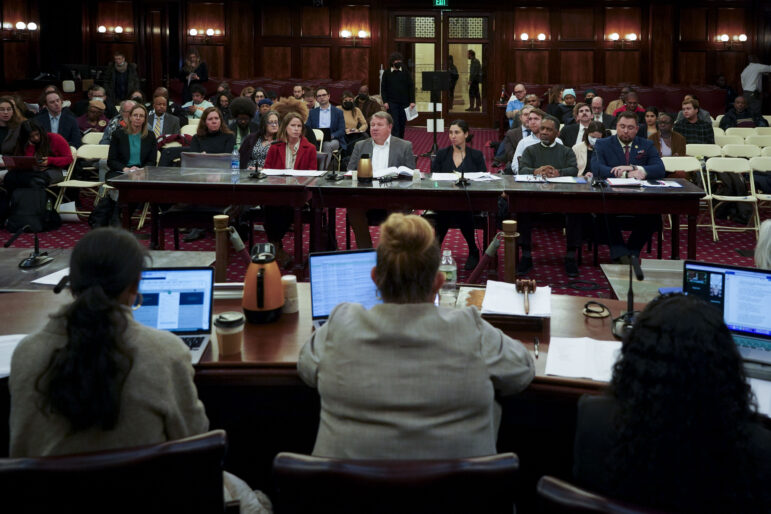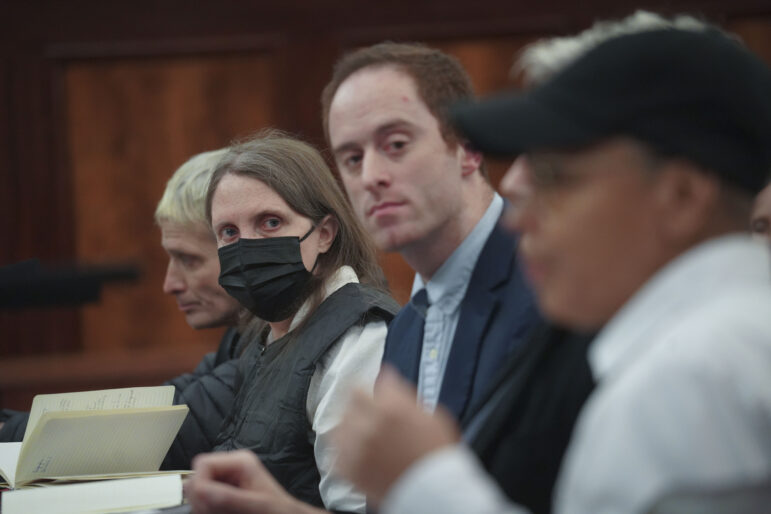“How can the agencies make this process more streamlined for the applicant, easier to navigate, less given to subjectivity and less prone to error and discrimination?” asked Deputy Speaker Diana Ayala.

Members of Mayor Eric Adams’ administration were questioned Thursday about the hurdles New Yorkers face in landing apartments with accompanying mental health services, particularly when it comes to navigating applications and interviews.
There are currently about 37,000 supportive apartments in the city, over 90 percent of them occupied. These units have restricted rents and come paired with support services for vulnerable tenants, including those who’ve experienced homelessness and people living with a mental illness, disability or substance use disorder.
The application process requires everything from housing and work history to a psychiatric evaluation, and is followed by an interview with a nonprofit housing provider that tenants say is overly burdensome and, at times, discriminatory, allowing providers to screen out applicants they deem too difficult.
“Would you agree, that perhaps, a subjective assessment could result in disability discrimination?” Brooklyn Council Member Crystal Hudson asked Jamie Neckles, assistant commissioner for the Bureau of Mental Health at the city’s Department of Health and Mental Hygiene (DOHMH).
“So yes, any time there’s subjectivity there’s opportunity to discrimination, racism, bias, to creep into the process,” Neckles said. “We guard against that and… provide as much guidance to avoid that.”
Thursday’s supportive housing oversight hearing—the first focused on the model since Dec. 2020—was co-hosted by the committees on General Welfare, Mental Health Disabilities and Addiction, and Veterans.
Deputy Speaker Diana Ayala also drilled down on the interview step. “How can the agencies make this process more streamlined for the applicant, easier to navigate, less given to subjectivity and less prone to error and discrimination?” she asked.
Michael Bosket, administrative director of social services at the Human Resources Administration (HRA), said a new “low barrier admission” policy directs providers not to use criminal background or credit checks.
He also touted a 46 percent increase in supportive housing acceptances in the year ending in June, up from 1,224 the year prior, and said denials can be attributed, in part, to a supply and demand imbalance.
“For each unit of supportive housing where we place an individual there are about five other people waiting,” he said.
Neckles added that the city is trying to “reframe” the interview as an opportunity for prospective tenants to view apartments.
“It’s a conversation between the provider and the tenant whether this is where they want to live,” she said. “Because we want it to be a conversation that also means we don’t want it to be a checklist script. We do want an opportunity for human interaction, right?”
But in practice, one psychiatrist testified hours deep into the hearing, the application and interview process creates a bottleneck, and discourages honest representation of one’s needs for fear of rejection.
“There are unspoken expectations in place about how to present the applicant in the proper light. I think of this as the Goldilocks dilemma,” said Dr. Tamar Lavy. “Will their needs be interpreted by the facility as too much, too little, or just enough?”
City officials were also asked to answer for the over 2,000 vacant supportive housing apartments across the city, at a time when city shelters are bursting. Of those, Bosket said, about 600 are linked to tenants who have yet to move in.
“Those 1,400 units that are left… many of those units may be older units,” he said. “Approximately 9,000 units of supportive housing… are some of the original buildings that have been around for some time and may be less desirable because they’re in [Single Room Occupancy] settings or areas that clients don’t want to live in.”

Members of Supportive Housing Organized and United Tenants, or SHOUT, led off Thursday’s hearing, speaking to the Council before city officials were called to testify. The tenant group advocated for the passage of Local Law 3 of 2022, which tracks supportive housing rejections by reason.
Any findings of discrimination must inform future city agency processes, said tenant Corey O’Connor. “SHOUT knows that applicants and tenants deserve more from the systems that are supposed to support us through our journeys,” he said.
More than 120 rejections in this year’s Local Law 3 report were categorized as “program does not provide level of service the client needs,” while nearly 90 were attributed to care, treatment and medication needs “beyond the scope of the facility.”
Bronx Council Member Pierena Sanchez asked the city to explain what accounts for this gap. “Has there been a consideration by the agencies to change the requirements of providers to provide all of those frequently-needed services, by any chance?” she said.
Neckles, of DOHMH, said that supportive housing is not a clinical setting. “Our approach is to provide education to the providers about how to link to those services in the community—where they are funded, often reimbursable—and then not attached to the person’s tenancy,” she added.
Joelle Ballam-Schwan, associate director of engagement and communications at the Supportive Housing Network of New York, an industry trade group, did not discuss the interview process Thursday, focusing instead on provider staffing needs and warning about the consequences of two impending rounds of 5 percent city budget cuts.
“These cuts will have disastrous impacts on the city’s supportive housing system and the already-strained agencies charged with overseeing mental health and housing programs and projects,” she said.
Addressing Council members Thursday, SHOUT co-founder Kat Corbell said that she will have lived in supportive housing for four years next week, and has dealt with a range of issues, from apartment disrepair to lax support services.
In one instance, she recalled, her apartment flooded due to a leak in an upstairs apartment. She called 311, but it wasn’t immediately clear which government entity should be enlisted to ensure her provider fixed the issue. The pipe later burst, she said, spewing scalding water.
“Where is the support in supportive housing?” she said. “That is what they are paid for, and that is not what the tenants are receiving.”
To reach the reporter behind this story, contact Emma@citylimits.org. To reach the editor, contact Jeanmarie@citylimits.org.








